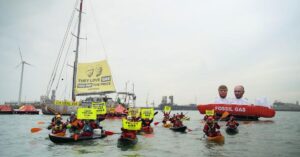
$1 Million In Gold & Silver Coins Discovered From Shipwreck Along Florida’s Treasure Coast
October 4, 2025
World’s First Hydrogen-Powered Bulk Carriers To Have Swedish Fuel Cells
October 4, 2025

A Greenpeace protest at the Zeebrugge liquefied natural gas (LNG) terminal disrupted vessel traffic for more than a day, forcing several LNG carriers to delay arrival or change course.
The blockade, which lasted nearly 29 hours, was ended by Belgian police and military forces, with more than 40 activists arrested and Greenpeace’s sailing vessel Witness removed from the terminal area.
The action began on Wednesday, October 1, when around 70 Greenpeace activists from 17 countries staged a blockade using small boats, kayaks, liferafts, and the sailing vessel Witness (74 feet/22.5 metres).
The group positioned themselves strategically to block the terminal entrance shortly after an LNG carrier departed the facility operated by Fluxys.
Protesters installed a large inflatable structure depicting Vladimir Putin and Donald Trump aboard a gas tanker, alongside a banner reading: “They love gas, you pay the price.”
Greenpeace said the action aimed to highlight Europe’s dependence on fossil gas imports from Russia and the United States and to demand a full phase‑out of fossil gas by 2035.
The blockade directly affected ship movements. The LNG carrier Arctic Voyager (75,485 dwt), operated by K Line and inbound from Norway, delayed its arrival until October 3.
Knutsen OAS Shipping’s Rias Baixas Knutsen (96,354 dwt) reported drifting off the coast of Spain. Reuters data showed that the Megara (95,452 dwt), arriving from the U.S. for Shell’s STASCO, and MOL’s LNG Phecada (91,712 dwt), arriving from Russia, postponed their calls. The LNG Phecada is now scheduled to arrive on October 5, while the Megara remained in the mid-Atlantic awaiting new instructions.
Fluxys confirmed that terminal operations continued despite the disruption but admitted that vessel traffic was affected. The company had expected the protest to last until at least Sunday, October 5, before police intervention.
Greenpeace described the removal of activists as a setback but said its campaign would continue. Lisa Göldner, a Fossil Fuel Campaigner for Greenpeace Germany, said the group will keep urging the EU and national governments to stop importing Russian LNG, halt new U.S. LNG supply contracts, and commit to a full phase-out of fossil gas.
The Zeebrugge terminal is one of Europe’s main hubs, handling most of the Russian LNG entering the continent and an increasing volume of U.S. imports.
Police and military units took several hours to dismantle the blockade, arresting activists and towing Witness to a nearby dock. Greenpeace said that despite cold conditions, humidity, and a lack of sleep, protestors remained committed to the cause throughout the operation.
Reference: Greenpeace
Source: Maritime Shipping News


